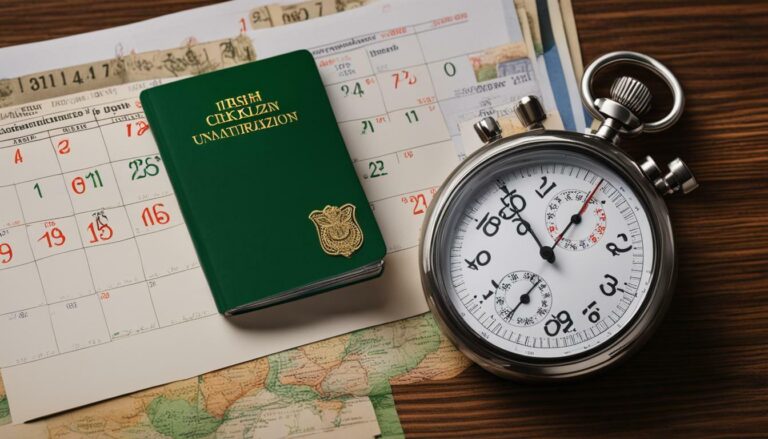Insight: Mandatory Civic Integration Exams for Netherlands PR
If you’re considering applying for Netherlands PR, it’s important to understand the mandatory civic integration exams that you’ll need to take. These exams are designed to assess your proficiency in the Dutch language and your knowledge of Dutch society. In this article, we will provide an overview of the civic integration exams, including the requirements, exemptions, and resources available to help you succeed.
Key Takeaways:
- Mandatory civic integration exams are required for individuals seeking Netherlands PR.
- The exams assess proficiency in the Dutch language and knowledge of Dutch society.
- Exemptions may apply for citizens of certain countries, individuals under 18 or over retirement age, those with specific educational qualifications, and temporary students or workers.
- The civic integration process must be completed within 3 years of arriving in the Netherlands.
- Additional information about language courses, exam preparation, and financial assistance can be found on inburgeren.nl.
Understanding the Civic Integration Requirement
The civic integration requirement is a crucial step in the Netherlands PR application process, assessing an individual’s knowledge of the Dutch language and society. It is designed to ensure that newcomers to the country have the necessary skills and understanding to integrate successfully into Dutch society. The requirement applies to individuals who need an MVV (authorisation for temporary stay) to enter the country and can be fulfilled by taking the mandatory civic integration exams.
The civic integration exams consist of two main components: the language proficiency exam and the knowledge of Dutch society exam. The language proficiency exam assesses an individual’s ability to speak, understand, read, and write in Dutch. It measures proficiency at A2 level, which is considered basic fluency. The knowledge of Dutch society exam tests an individual’s understanding of Dutch laws, culture, history, and social norms. It is essential to prepare for these exams to ensure success in the PR application process.
| Who is exempt from the civic integration requirement? | Notes |
|---|---|
| Citizens of certain countries | Individuals from countries with special agreements with the Netherlands may be exempt from the civic integration requirement. |
| Individuals under 18 or over retirement age | Young children and individuals who have reached retirement age are not required to take the civic integration exams. |
| Those with specific educational qualifications | Individuals with certain educational qualifications, such as a Dutch diploma, may be exempt from the civic integration requirement. |
| Temporary students or workers | Those who are in the Netherlands temporarily, such as students or workers on short-term contracts, are not required to take the exams. |
It’s important to note that the civic integration process must be completed within 3 years of arriving in the Netherlands. Failure to fulfill this requirement may result in delays or rejection of the PR application. To ensure successful integration and a smooth application process, it is recommended to choose a language or civic integration course to prepare for the exams. There are various options available, and it’s essential to select the right course based on individual needs and preferences.
Language Proficiency Exam
One of the components of the civic integration exam is the language proficiency test, which evaluates your ability to communicate effectively in Dutch. This exam is designed to assess your understanding of the Dutch language, including your proficiency in speaking, writing, reading, and listening.
Format of the Exam:
The language proficiency exam consists of several sections that test different language skills. It typically includes listening comprehension exercises, reading comprehension passages, writing tasks, and speaking assessments. The exam aims to assess your ability to understand and use the Dutch language in practical situations, such as conversations, reading texts, and writing simple essays or emails.
“The language proficiency exam evaluates your ability to communicate effectively in Dutch, including your proficiency in speaking, writing, reading, and listening.”
Tips for Preparation:
To prepare for the language proficiency exam, it is essential to practice all aspects of the Dutch language. Here are a few tips to help you succeed:
- Immerse yourself in the language: Surround yourself with Dutch language content, such as books, movies, TV shows, and music. This will help you become more familiar with the language and improve your comprehension skills.
- Practice speaking: Engage in conversations with native speakers or language exchange partners to improve your speaking skills. Practice common phrases, vocabulary, and pronunciation to feel more confident during the exam.
- Read and listen: Read Dutch newspapers, books, and online articles to improve your reading skills. Listen to Dutch podcasts, radio shows, or watch Dutch TV programs to enhance your listening comprehension.
- Take mock exams: Utilize online resources that offer practice exams similar to the official language proficiency test. This will help you familiarize yourself with the exam format and assess your strengths and weaknesses.
| Component | Skills Assessed |
|---|---|
| Listening Comprehension | Ability to understand spoken Dutch in various contexts |
| Reading Comprehension | Ability to understand written Dutch texts of different genres and styles |
| Writing | Ability to produce written Dutch texts with correct grammar, vocabulary, and coherence |
| Speaking | Ability to communicate orally in Dutch, engage in conversations, and express opinions |
Knowledge of Dutch Society Exam
Alongside the language proficiency exam, the civic integration exams also include a knowledge of Dutch society test, which evaluates your understanding of various aspects of Dutch culture, history, and social norms. This exam is designed to ensure that individuals seeking Netherlands PR have a good grasp of the country’s society and values.
The knowledge of Dutch society exam covers a wide range of topics including Dutch history, government structure, traditions, and social customs. It assesses your knowledge of Dutch geography, landmarks, and famous Dutch personalities. It also tests your understanding of the Dutch education system, healthcare system, and the rights and responsibilities of Dutch citizens.
To prepare for the knowledge of Dutch society exam, it is recommended to study a variety of resources. The inburgeren.nl website offers study materials, practice exams, and online courses to help you familiarize yourself with the topics that will be covered. Additionally, there are books, websites, and online forums where you can find more information and engage in discussions with others preparing for the exam.
Below is a table summarizing the topics covered in the knowledge of Dutch society exam:
| Topic | Description |
|---|---|
| Dutch History | Understanding key events and historical figures in Dutch history. |
| Government Structure | Knowledge of the Dutch political system, including the roles of the monarchy, parliament, and local government. |
| Traditions and Customs | Familiarity with Dutch traditions, customs, and celebrations. |
| Geography and Landmarks | Knowledge of the Dutch geography, major cities, and landmarks. |
| Dutch Education and Healthcare | Understanding of the Dutch education system and healthcare system. |
| Rights and Responsibilities | Awareness of the rights and responsibilities of Dutch citizens. |
By thoroughly preparing for the knowledge of Dutch society exam, you will increase your chances of successfully passing the civic integration exams and fulfilling the requirements for Netherlands PR.
Taking the Exams at the Embassy/Consulate
Once you’re ready to take the civic integration exams, you can do so at the embassy or consulate of the Netherlands in your country of residence. This allows you to conveniently complete the exams without the need for international travel.
Before visiting the embassy or consulate, it is important to schedule an appointment in advance. This ensures that you will have a designated time slot and allows the embassy or consulate to prepare for your visit.
During your appointment, you will be required to provide the necessary identification documents, such as your passport or identification card, as well as any other relevant documentation. It is important to double-check the specific requirements for your country, as they may vary.
Once you have completed the necessary paperwork, you will proceed to take the civic integration exams. These exams typically consist of a language proficiency test and a knowledge of Dutch society test. To prepare for the exams, it is recommended to study the resources available on the inburgeren.nl website, which provide valuable information and practice materials.
| Important Points: | Takeaway: |
|---|---|
| 1. Schedule an appointment with the embassy or consulate in advance. | Plan ahead to ensure a smooth and efficient exam process. |
| 2. Bring all necessary identification documents and any additional required documentation. | Be prepared and avoid any delays or complications. |
| 3. Study the resources provided on the inburgeren.nl website to prepare for the exams. | Maximize your chances of success by familiarizing yourself with the exam content and format. |
By taking the civic integration exams at the embassy or consulate, you can fulfill the necessary requirements for Netherlands PR while saving time and effort. Remember to plan ahead, bring all required documents, and adequately prepare for the exams to increase your chances of success.
Exemption from the Civic Integration Requirement
While the civic integration requirement applies to most individuals seeking Netherlands PR, there are certain groups who may be exempt from this obligation. Citizens of certain countries, such as Belgium, Suriname, and some former Dutch colonies, are exempt from the civic integration exams as they are already considered to have sufficient knowledge of the Dutch language and society. Individuals under the age of 18 or over retirement age are also exempt, recognizing that these age groups may face unique challenges in meeting the requirements. Additionally, those with specific educational qualifications, such as a Dutch diploma or a diploma from a recognized educational institution, may also be exempt.
To apply for an exemption, individuals must submit relevant documents to prove their eligibility. These documents may include birth certificates, educational diplomas, or residence permits. It is important to carefully review the exemption requirements and gather all necessary documentation before applying. The exemption application can be submitted online through the inburgeren.nl website or can be sent by mail to the Immigration and Naturalization Service (IND).
For individuals who are temporarily unable to take the civic integration exams outside the Netherlands due to circumstances such as illness, an exemption can also be requested. In such cases, a medical certificate or other supporting documentation may be required to verify the inability to travel. It is recommended to consult with the IND or the embassy/consulate for specific instructions on how to apply for an exemption based on medical reasons.
| Exempted Groups | Requirements for Exemption |
|---|---|
| Citizens of certain countries | Proof of citizenship and residence |
| Individuals under 18 or over retirement age | Proof of age or retirement status |
| Those with specific educational qualifications | Proof of educational diplomas |
“The civic integration requirement is an important step towards successful integration into Dutch society. However, it is crucial to recognize that certain groups may be exempt from this obligation. By providing the necessary documentation and following the application process, eligible individuals can seek exemption from the civic integration exams. This ensures fairness and flexibility for those who may face unique circumstances or already possess the required knowledge and skills.”
Conclusion
Understanding the civic integration requirement for Netherlands PR is essential for individuals who are planning to move to the country. While most applicants are required to take the civic integration exams, exemptions are available for certain groups. By familiarizing themselves with the exemption criteria and submitting the required documents, eligible individuals can seek exemption from the exams. It is important to be well-informed about the exemption process and to carefully follow the instructions provided by the IND or the embassy/consulate. Ultimately, the civic integration requirement plays a crucial role in promoting integration and ensuring that individuals have the necessary language skills and knowledge to thrive in Dutch society.
Completing the Civic Integration Process
It’s essential to complete the civic integration process within three years of your arrival in the Netherlands to ensure a smooth application for PR. This process consists of passing the mandatory civic integration exams, which test your language proficiency in Dutch and knowledge of Dutch society. To successfully complete the process, it’s important to stay organized and focused on meeting the requirements.
When preparing for the exams, it is recommended to enroll in a language or civic integration course. These courses provide structured learning and guidance, helping you develop the necessary language skills and knowledge for the exams. The inburgeren.nl website offers a list of recognized courses that you can choose from.
Once you feel confident in your language and societal knowledge, you can schedule your exams at the embassy or consulate of the Netherlands in your country of residence. Make sure to check the available dates and any additional requirements before booking your appointments. It’s important to arrive prepared and well-rested on the day of the exams.
After completing the exams, the results will be communicated to you, usually within a few weeks. If you pass the exams, congratulations! You have successfully completed the civic integration process. If you unfortunately did not pass, don’t be discouraged. You can retake the exams and continue your preparation until you succeed.
Summary:
- Complete the civic integration process within three years of arrival in the Netherlands for a smooth PR application.
- Enroll in a language or civic integration course to enhance your language skills and knowledge of Dutch society.
- Schedule and prepare for the mandatory civic integration exams at the embassy or consulate in your country of residence.
- Results will be communicated to you, providing an opportunity to retake the exams if necessary.
| Exam Component | Description |
|---|---|
| Language Proficiency Exam | Tests your ability to understand and communicate in Dutch language. |
| Knowledge of Dutch Society Exam | Evaluates your understanding of Dutch history, culture, and societal norms. |
“Completing the civic integration process is crucial for a successful PR application in the Netherlands. It demonstrates your commitment to integrating into Dutch society and contributing to its cultural fabric.” – Immigration Expert
Choosing a Language or Civic Integration Course
To adequately prepare for the civic integration exams, it’s recommended to enroll in a language or civic integration course that suits your learning style and goals. These courses are designed to provide the necessary knowledge and skills to pass the exams and successfully integrate into Dutch society.
When selecting a course, consider your preferred learning methods and the level of support you require. Some courses offer a classroom-based approach with structured lessons and face-to-face interaction, while others provide online materials and virtual classrooms for flexible learning.
It’s also important to assess the curriculum and ensure it covers the specific topics and skills tested in the civic integration exams. A comprehensive course will focus on improving language proficiency, teaching about Dutch culture and society, and providing study materials for the exams.
Recommended Language and Civic Integration Courses
| Course Name | Description | Delivery Method |
|---|---|---|
| Dutch Language School | A well-established language school offering beginner to advanced Dutch language courses. Specialized civic integration courses are available. | In-person |
| Online Integration Course | An interactive online course designed for self-paced learning. It covers all the necessary topics and provides practice exercises. | Online |
| Civic Integration Program | A comprehensive program that combines Dutch language lessons with in-depth knowledge of Dutch society and culture. | In-person and online |
Before enrolling, consider reading reviews from previous students to gauge the effectiveness of the course and the satisfaction of its participants. Additionally, check if the course is accredited or endorsed by recognized organizations to ensure its quality and credibility.
By choosing the right language or civic integration course, you can enhance your chances of success in the mandatory civic integration exams and pave the way for a smooth integration into Dutch society.
Financial Assistance for Civic Integration
If you’re concerned about the financial aspect of the mandatory civic integration exams, there are options available to help you manage the costs. The Dutch government understands the importance of these exams in the integration process and offers financial support to eligible individuals.
One option is to apply for a loan to cover the expenses associated with the civic integration exams. The loan, known as the ‘Inburgeringslening’, is provided by the Dutch government and allows you to borrow money to pay for the exams, as well as any necessary language or civic integration courses. The loan has a low interest rate and flexible repayment terms, making it an accessible and affordable solution for those in need.
Additionally, if you meet certain income criteria, you may be eligible for financial assistance from your municipality. This assistance can help cover the costs of the civic integration exams, courses, and other related expenses. To determine your eligibility and apply for this support, you will need to contact your local municipality and provide the necessary documentation.
Financial Assistance Overview
To help you better understand the financial assistance options available, here is a summary:
| Option | Description |
|---|---|
| Inburgeringslening | A loan provided by the Dutch government to cover the costs of the civic integration exams, language courses, and other related expenses. |
| Municipal Financial Assistance | Financial support provided by your local municipality to eligible individuals based on income criteria. This assistance can help cover the costs of the civic integration process. |
It’s important to note that financial assistance options may vary depending on your personal circumstances and the specific policies of your municipality. For detailed information on eligibility criteria and application procedures, it is recommended to visit the official inburgeren.nl website or contact your local municipality directly. By exploring these financial assistance options, you can alleviate the financial burden associated with the mandatory civic integration exams and focus on successfully completing the process for your Netherlands PR application.
Conclusion
The mandatory civic integration exams play a crucial role in the Netherlands PR application process, evaluating an individual’s language proficiency and knowledge of Dutch society. By understanding the requirements and adequately preparing for these exams, you can enhance your chances of a successful PR application.
In order to obtain a Netherlands PR, individuals may need to take a civic integration exam before their arrival. This exam tests proficiency in the Dutch language as well as knowledge of Dutch society. It is an important step in the immigration process and should not be taken lightly.
The civic integration exams can be taken at the embassy or consulate of the Netherlands in your country of residence. However, if you are unable to take the exam outside of the Netherlands due to circumstances such as illness, you may be eligible for an exemption. Certain individuals, such as citizens of specific countries or those under 18 or over retirement age, may also be exempt from the civic integration requirement.
It is essential to complete the civic integration process within 3 years of arriving in the Netherlands. Failure to do so may have implications for your PR application. To adequately prepare for the exams, consider enrolling in a language or civic integration course. These resources can provide the necessary tools and guidance to succeed in the exams.
For more information on the civic integration exams, exemptions, and financial assistance options, please visit the official inburgeren.nl website. Understanding and preparing for these exams will not only help you meet the requirements for Netherlands PR, but also contribute to your integration into Dutch society.
FAQ
Q: What is the civic integration exam?
A: The civic integration exam is a mandatory exam that tests proficiency in the Dutch language and knowledge of Dutch society. It is required for individuals seeking Netherlands PR.
Q: Who needs to take the civic integration exam?
A: Individuals who need an MVV (authorisation for temporary stay) to enter the Netherlands may need to take the civic integration exam. It is required for those joining a Dutch partner or moving to the country.
Q: Where can I take the civic integration exam?
A: The civic integration exam can be taken at the embassy or consulate of the Netherlands in your country of residence.
Q: Are there any exemptions from the civic integration requirement?
A: Yes, citizens of certain countries, individuals under 18 or over retirement age, those with specific educational qualifications, and temporary students or workers are exempt from the civic integration requirement.
Q: What happens if I am unable to take the exam outside the Netherlands?
A: If you are unable to take the civic integration exam outside the Netherlands due to circumstances such as illness, you can apply for an exemption.
Q: Is there a time limit for completing the civic integration process?
A: Yes, the civic integration process must be completed within 3 years of arriving in the Netherlands.
Q: How can I choose a language or civic integration course?
A: You can find information on choosing a language or civic integration course on the inburgeren.nl website. It is important to select a course that suits your needs and prepares you for the exams.
Q: Can I receive financial assistance for the civic integration exams?
A: There are options for obtaining financial assistance to cover the costs of the civic integration exams. You may be able to obtain a loan to cover these expenses.
Source Links
- https://www.government.nl/topics/immigration-to-the-netherlands/question-and-answer/do-i-need-to-start-civic-integration-before-i-arrive-in-the-netherlands
- https://www.government.nl/topics/immigration-to-the-netherlands/question-and-answer/do-i-have-to-comply-with-dutch-civic-integration-requirements
- https://ind.nl/en/forms/7616.pdf







